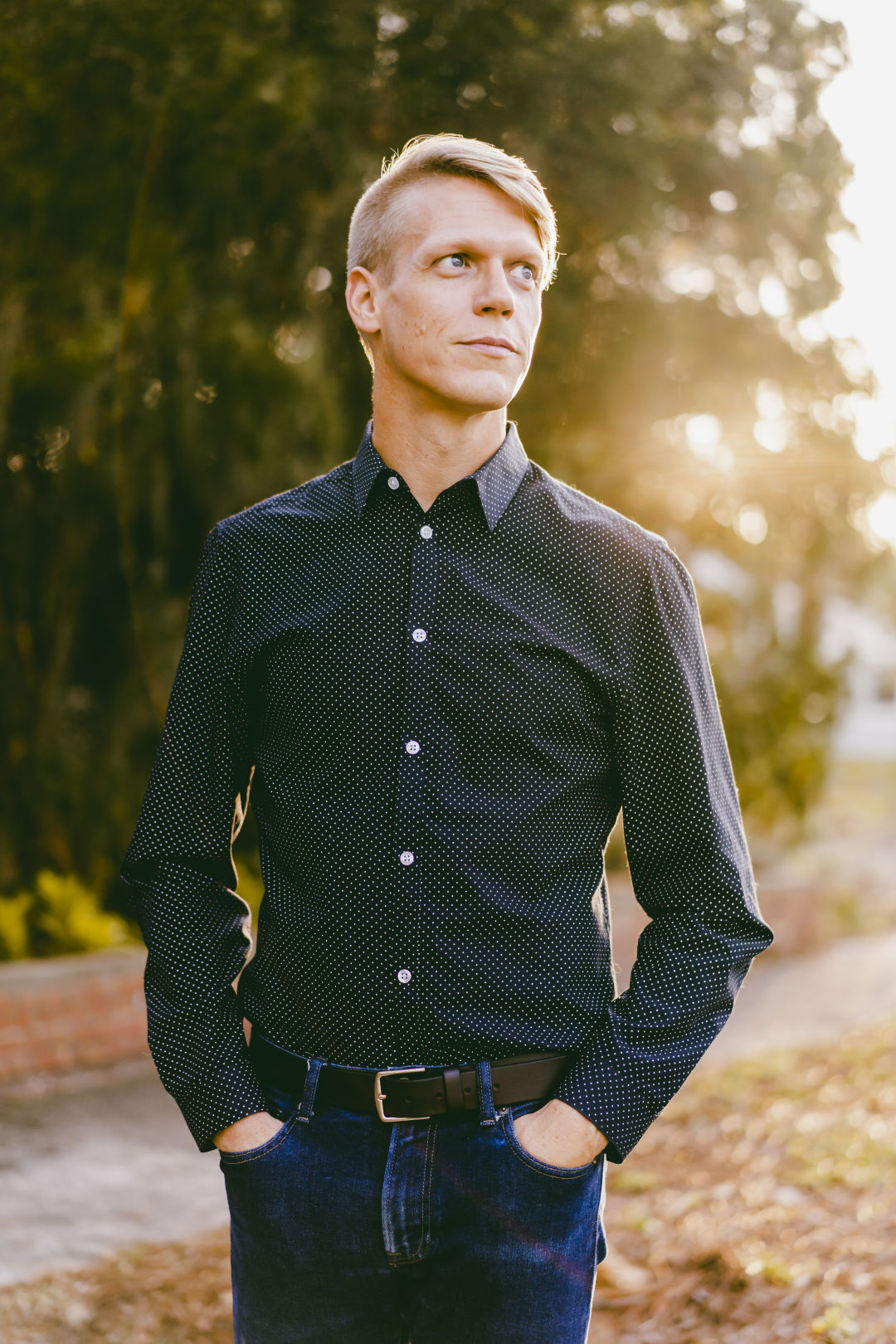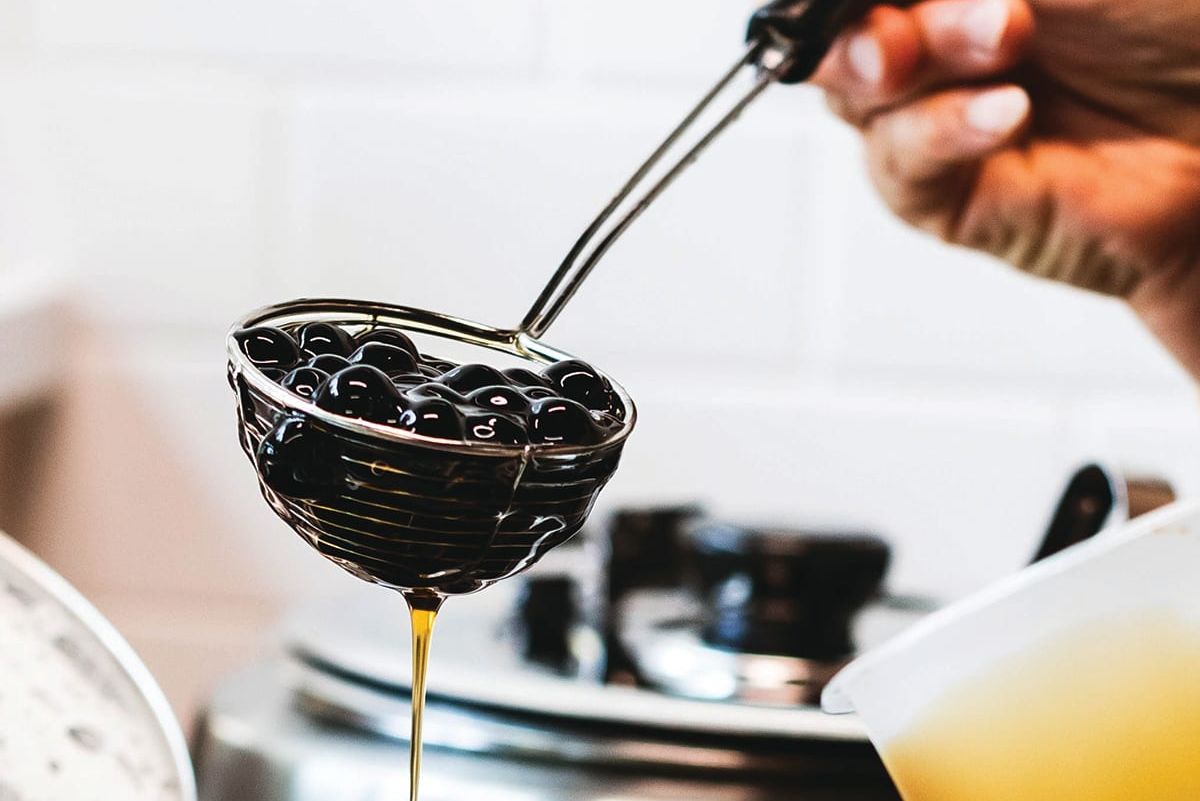Our Editor Cooper Levey-Baker Releases His Debut Novel Today

Cooper Levey-Baker
Image: Karen Arango
Regular readers have seen senior editor Cooper Levey-Baker’s byline in Sarasota Magazine for years—he’s won numerous awards for his work, including from the Florida Magazine Association and the Florida Society of Professional Journalists. He’s also the magazine’s food editor, reporting on everything from the best restaurants in Sarasota to food trends to local makers.
And next month, on Jan. 20, Levey-Baker will release his first book—but unlike his journalism, Dead Fish Wind is a work of fiction. That said, as you might guess from the title—and the scarlet cover—red tide plays a role in the plot, and the book is set in a Sarasota-like city in Southwest Florida. Eagle-eyed locals will have fun guessing which people, buildings and events inspired plot points in the book.
We chatted with Levey-Baker about the inspiration for the book, his writing process, how Sarasota plays into the story, and what he hopes readers will take away from reading it.
Was writing a book—specifically a novel—always something you wanted to do?
“When I was an undergrad in college, I had a very vague ambition that I wanted to be a writer—but I didn’t know what shape that would take. When I was 22 or 23, I wrote a book. I really enjoyed it, and it was a good learning experience, but it was terrible. Around the same time, I was starting to work as a journalist, and that took over for me—I loved it, as well. But I still had a book in the back of my mind, and in 2013 I enrolled in the University of Tampa’s new Master of Fine Arts in creative writing program and studied fiction.”
How did the idea for Dead Fish Wind originate?
“I started working on it in grad school, and the impetus was a writing exercise. Our teacher told us to set aside what we were working on, get out a fresh sheet of paper, and start writing whatever came to mind. For me, that was the image of a young woman wearing a trench coat and walking in strong wind—fighting it off. She was walking home from work, and when she entered her home, her father was there smoking a pipe. I had no idea where it came from. It seemed to just pop into my mind out of nowhere, and that experience was strangely powerful. Also, after the writing exercise was over, I got some positive feedback about what I had written, which made me think that there was something there worth exploring more deeply.
“I had to write a thesis for grad school, and it was the basis for my thesis. I had a very rough draft completed in 2014, and I graduated and spent another year rewriting it. I finished a draft I was happy with in 2016. From there, it was editing—cutting a paragraph here, a line there. In 2017, I started sending it out to publishers.”

Dead Fish Wind
Image: Courtesy Photo
Madville Publishing is based in Texas—how did you find each other?
“A writer named Brian Petkash, who I went to graduate school with, published a short story collection called Mistakes by the Lake with Madville in 2020. He recommended me to them. I went through the process of submitting the manuscript and having it read by a blind reviewer unaffiliated with the publisher. Whoever that was gave me thumbs up in August 2020. It was strange and a little surreal to get such great news in the middle of the pandemic—I was ecstatic.”
Dead Fish Wind’s protagonist is a young woman named Cicely whose future looks bleak when we meet her. She lives in an unfinished condo project and takes care of her dad; her mother has abandoned her; she has no real friends; she works a dead-end job as cocktail waitress at a gentleman’s club-type spot that also serves as a community gathering place. In the book, Cicely makes her first-ever friend, deals with her feelings about her family, and gets involved with a villainous doula who's illegally selling placentas. Talk about how you came up with the story.
“Going back to the idea from graduate school, I knew the main character was a young woman with a deadbeat father. The book is written in limited third person, and everything is specifically from Cicely’s perspective. Figuring that out helped me. I was putting myself in her mind—how she sees things, experiences things, why she makes the decisions she does. That gave me the momentum I needed to figure out who the other characters are.
“What’s cool about fiction is that you can have interesting characters and randomly bump them into each other. That forces you to figure out what happens. An example of that in this book is with Cicely and the Owner, the guy who owns the condo that Cicely and her dad live in. Once you force Cicely to bump into him, you’re able to build up the characters by seeing how they react to each other. That takes you to places where you surprise yourself."
There are laugh-out-loud funny moments, too.
“I wanted to write something that was literary but had some genre elements, that wasn’t just someone contemplating the state of the universe. As one of my professors said, the whole point is to get the reader to turn to page two. How do you make sure that people keep going?”
The setting feels like Sarasota post-recession, but amped up. Cicely and her dad don’t have a reliable source of water in their home, for example.
“Yeah, it was like the aftermath of the financial crash on steroids. I took every problem or challenge that Sarasota has and turned the dial up at the expense of the things that are great about living here. It’s dystopian; it’s not realistic. That’s not to say that Sarasota doesn’t have its dark side, or there’s not a lot of awful stuff that happens here. But the public image of Sarasota is so shiny and bright. It’s sunny. I wanted pick up the rock and look at what was underneath.”
How would you describe the place where Cicely works? Again, thinking about Sarasota, it feels like the Cheetah Club and Robarts Arena had a baby.
“There’s a place in Twin Peaks, which is set in a small town in Washington state, called the Roadhouse, and it’s where everything happens. Teenagers hang out there after school, criminals meet there to discuss plans, musicians play there—everyone knows everyone. I had that idea in my mind as the place where everything happens because there’s nowhere else to go. It’s cheap, ugly, degrading—and it’s the one place where Cicely has a connection to the outside world. It’s where she talks to and has other interactions with other adult human beings. I needed a place that would allow for all those types of interactions.”
Red tide is also a plot point, and you were working on this book at the same time as the horrific bloom in 2018. Was that a coincidence?
“Yes, it was. The first time I’d ever heard of red tide was after the 2005-2006 blooms that lasted for months—I remember hearing from hotels about how people were cancelling trips. When I worked for Creative Loafing, I wrote a story about it that forced me to understand the science. The thing is, the bloom goes away and everyone forgets about it. I wanted to include it as background, because when I was writing the book, not a lot of people knew about it or were talking about it. Then came 2018.”
Was it challenging to write from a female character’s perspective?
“It was a challenge, and something I was and am scared to do. Using the third-person limited point of view instead of trying to write a first-person narrative helped a lot. I’m not trying to speak with another person's voice, but instead describe what’s happening and then dip into the character's mind here and there. I also incorporated feedback from women who were mentors in my writing program, female classmates, my publisher and, of course, my wife. All of that was vital.”
Sarasota Magazine’s creative director, Gigi Ortwein, designed the cover for Dead Fish Wind—talk about that collaboration.
“Madville Publishing has designers who do really nice covers, but I love Gigi’s work. So I asked her if she would take a stab at a cover for me. She came up with a few ideas, we kicked them back and forth, and my publisher liked them.”
What do you want readers to take away from the book?
“I don’t have any message; there’s no takeaway. I just want to deliver a pleasurable experience—something that’s a little provocative. If someone reads it and it stays with them, that’s all that matters.”
Dead Fish Wind will be released by Madville Publishing on Jan. 20, 2022; you can pre-order a copy from Bookstore1Sarasota. Levey-Baker will also host a book release party on Jan. 20, 2022, at Fogartyville in downtown Sarasota. Tickets are $20 and include a copy of the book. For more information, click here.



